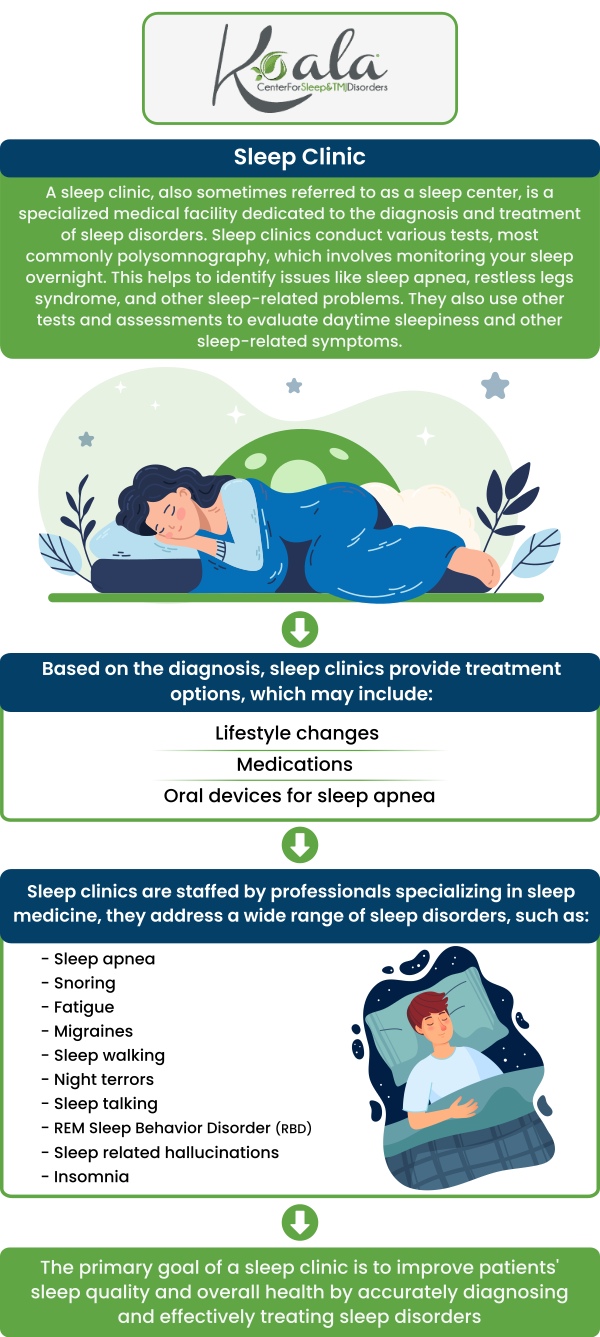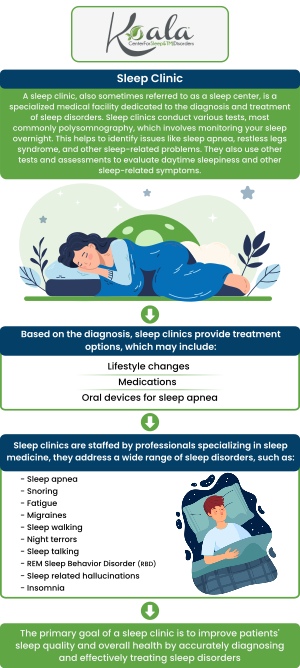Should I Visit a Sleep Clinic?
Discover the benefits of visiting a sleep clinic and why you should consider visiting one, too. Call Koala® Center For Sleep & TMJ Disorders today to book an appointment. We serve patients from Shadeland IN, Battle Ground IN, Ash Grove IN, Dayton IN and Buck Creek IN.




Table of Contents:
What kind of doctor should I see for sleep problems?
What are the warning signs of sleep apnea?
What are the risk factors of sleep apnea?
Should I see a sleep doctor?
Sleep is one of the most essential functions of life, yet nearly 1 in 3 adults do not get enough. The effects this has on one’s health can be detrimental, even debilitating. Fortunately, there are medical professionals who are dedicated to helping people improve the quality of their sleep. In fact, there are medical facilities that deal exclusively with sleeping problems, and these sleep clinics have helped countless people develop better sleeping patterns by addressing the root cause of their concern.
The kind of doctor you see for your sleep problems depends on what is causing the problems. Many kinds of sleep problems are associated with the jaw, or temporomandibular joint. In this case, a dentist would be the best doctor to see. If sleeping problems are caused by stress, anxiety or depression, a psychiatrist may be the best professional to address these concerns.
The warning signs of sleep apnea include:
– Excessive daytime sleepiness
– Loud snoring
– Waking up with a headache
– Observed episodes of stopped breathing during sleep
– Abrupt awakenings accompanied by gasping or choking
– Awakening with a dry mouth or sore throat
– Difficulty concentrating during the day
– Mood changes, such as depression or irritability
– High blood pressure
– Nighttime sweating
– Decreased libido
There are certain conditions, anatomies and lifestyle factors that increase the risk of developing sleep apnea, including the following:
– Excess weight — Those who are obese or overweight are at higher risk of having sleep apnea, as the excess weight can put pressure on the airways.
– Narrowed airway — Being born with narrow airways also increases the risk of sleep apnea, which can be caused by a deformity or simply the normal structure of a person’s body.
– High blood pressure (hypertension) — Sleep apnea is fairly common in people who have hypertension.
– Chronic nasal congestion — Sleep apnea is twice as common in those who are affected by chronic nasal congestion, regardless of its cause.
– Smoking — People who smoke are at higher risk of sleep apnea due to the restriction of airways.
– Gender — Sleep apnea affects twice as many men as it does women, however it is more common in women after menopause.
– A family history of sleep apnea — Physical characteristics can be passed down genetically that increase the risk for sleep apnea. It is also more likely to affect someone if one of their parents is affected by sleep apnea.
If you are experiencing any of the following signs or symptoms, it may be recommended to see a sleep doctor:
– You snore or gasp for air while sleeping
– You have a hard time falling asleep
– You have a hard time staying asleep
– You feel tired during the day, even if you have slept the night before
– You cannot perform your daily activities because you are too exhausted
If you or someone you love is wondering if they should visit a sleep clinic, call Koala® Center For Sleep & TMJ Disorders to speak with one of our caring sleep professionals. We can help you determine what is causing your sleeping problems and find the best treatment to resolve these issues. Our kind and compassionate professionals are dedicated to delivering the highest level of service at each visit, for every patient. Call us today to book an appointment. We look forward to serving you!

Additional Services You May Need
▸ KoalaKIDZzz®
▸ Sleep Apnea
▸ Snoring
▸ TMJ Disorder
▸ Fatigue
▸ Sleep Disorders
▸ Weight Loss
▸ CPAP Alternative
▸ Oral Appliances




